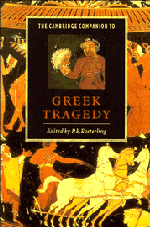Book contents
- Frontmatter
- Part I Tragedy as an institution
- Part II The plays
- Part III Reception
- 9 From repertoire to canon
- 10 Tragedy adapted for stages and screens
- 11 Tragedy in performance: nineteenth- and twentieth-century productions
- 12 Modern critical approaches to Greek tragedy
- Glossary
- Chronology
- Texts, commentaries and translations
- Works cited
- Index
12 - Modern critical approaches to Greek tragedy
from Part III - Reception
Published online by Cambridge University Press: 28 May 2006
- Frontmatter
- Part I Tragedy as an institution
- Part II The plays
- Part III Reception
- 9 From repertoire to canon
- 10 Tragedy adapted for stages and screens
- 11 Tragedy in performance: nineteenth- and twentieth-century productions
- 12 Modern critical approaches to Greek tragedy
- Glossary
- Chronology
- Texts, commentaries and translations
- Works cited
- Index
Summary
How are the texts of ancient drama to be understood by modern interpreters - separated as we are by so great a distance of time and difference of culture? This problem has been treated in many ways in this century, as the study of ancient literature, like the study of other literatures, has undergone rapid institutional and intellectual changes. There are many paths and genealogies that could be traced through this history, and not only do many different methodological approaches overlap and interrelate in a variety of complex ways, but also there is great variety within any one broad heading (such as 'structuralism'). In this chapter I shall try to unravel some of the main threads that make up the texture of contemporary debate about critical methodology with regard to Greek tragedy. The methodology of each critic who works on Greek tragedy - myself included, for sure - is not the application of a ready-made theory so much as the product of (at least) teachers' and colleagues' influence, reading and study within classical scholarship and other fields, institutional pressures, laziness, acumen ... In attempting to trace some of the main lines of enquiry, it is inevitable that the siting of each scholar within the intellectual and social institutions of classical scholarship cannot be finely nuanced. What is more, the teleology of a history that ends with a necessarily partial view of the here and now must distort the picture of the critical developments to be traced. None the less, some lines on the map - however tentatively drawn - will help an appreciation of how contemporary understandings of Greek tragedy have developed.
- Type
- Chapter
- Information
- The Cambridge Companion to Greek Tragedy , pp. 324 - 347Publisher: Cambridge University PressPrint publication year: 1997
- 18
- Cited by

